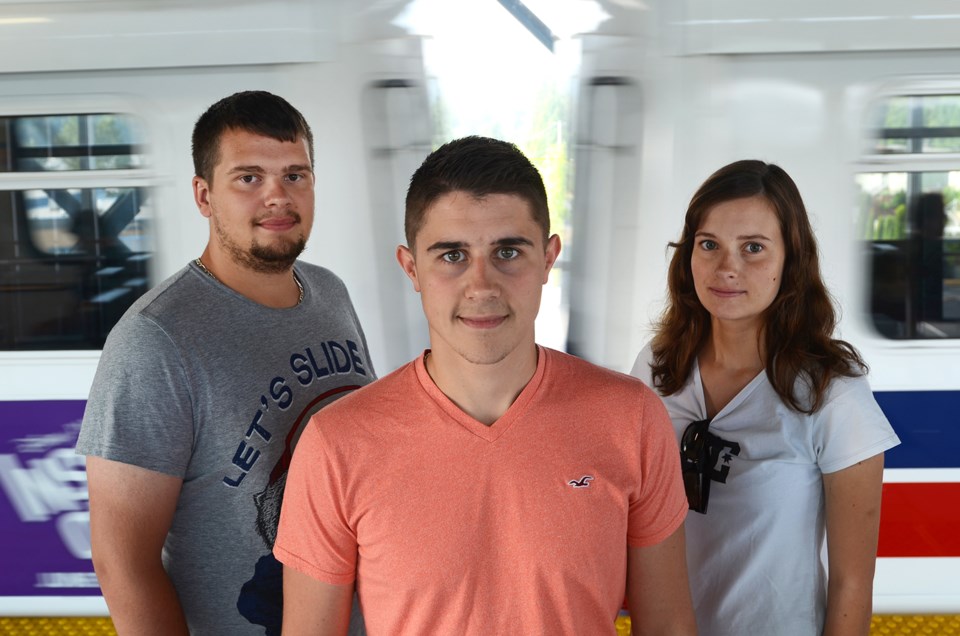A blind man who fell into the path off an oncoming SkyTrain last month may owe his life to a French student staying in Burnaby during an internship at SFU’s Burnaby Mountain campus.
Adrien Michel and two fellow engineering students from Dijon, France – Cathie Matz and Mathieu Humbert – who’ve all been at SFU since April, were on their way to Vancouver Island for the weekend via public transit on June 26.
As they waited on platform 3 at the Commercial-Broadway SkyTrain station, Michel said he looked up at the sound of an approaching train just in time to see a man fall onto the tracks.
He bounded to the spot, he said, and he and another bystander who had also seen the fall grabbed the man’s arms and hauled him onto the platform.
“I’m not sure the SkyTrain can stop at the good moment, so I prefer to run to help him to be sure,” Michel said.
“It was really scary,” said Matz, who didn’t see the man fall but witnessed the rescue.
She said the train would have hit the man if he hadn’t been pulled to safety.
“The SkyTrain stopped earlier than its normal position,” she said, “but regarding to the position of the guy, I think it was like maybe something like one metre after the position of the guy, so if he was still on the tracks and he didn’t succeed to go back on the platform, he might have been injured.”
It was only after pulling the man onto the platform that Michel realized the man, who was still holding a white cane, was visually impaired.
He appeared more embarrassed than hurt or panicked, according to Matz, and his main concern appeared to be his cane, which had been bent during the fall.
A SkyTrain attendant was on the scene within minutes, Michel said, and waited with the man after thanking Michel for his help.
For SFU physics professor Simon Watkins, who’s been working with Michel, Matz and Humbert, the incident raises concerns.
“My questions are the following,” he told the NOW in an email. “Why did the train not stop in time? If trains are going to operate without drivers, they need to have extremely robust sensors. Why was there no followup with the students? As far as I can see, there was no report generated. No contact info was given to the students. There is certainly video footage of this incident. What does it show?”
But TransLink told the NOW all emergency systems were working as they should, and a safety stop was initiated when the man fell onto the tracks.
“People and objects do occasionally fall into the guideway, which will immediately trigger our highly sensitive track intrusion system, causing the train to emergency brake, followed by a full investigation by staff,” TransLink media relations manager Cheryl Ziola said in an email.
While he may not have taken down Michel’s information, the SkyTrain attendant did get one witness’s name and phone number, Ziola said.
“Obviously you’re probably not going to take the name of every, single witness, but in this case we have sufficient information,” she said.
The man who fell onto the track was taken to hospital with unspecified injuries resulting from the fall, according to Ziola.
For privacy reasons, she said she couldn’t confirm the man was blind, but she said TransLink is considered a “best practices leader in accessibility features for the blind and disabled communities.”
At least one SkyTrain feature for blind and sight-impaired passengers is unique in North America, according to Rob Sleath, chair of Access for Sight Impaired Consumers, an advocacy group for people with visual impairment.
He said he has not heard of another light-rail rapid transit system on the continent with a service like SkyTrain’s VIP Assistance Line, which blind and sight-impaired passengers can call when they are near a station.
“They’ll send a SkyTrain attendant down to assist us, either up to the platform or down from the platform, out to the closest bus stop … They’ll guide us right on the train,” Sleath said.
His organization lobbied TransLink for the service, and the transit authority started offering it about 12 years ago.
At about the same time, Access for Sight Impaired Consumers also successfully lobbied TransLink to install the yellow, tactile platform edges in SkyTrain stations, which allow sight-impaired passengers to feel when they are close to the platform edge.
Sleath said incidents of sight-impaired passengers falling onto SkyTrain tracks went down significantly after the feature was added, with about 24 incidents in the 16 years before, and three – including the most recent fall – in the 12 years since.
Sleath said he was surprised to hear a blind man had fallen onto the tracks considering the features that are in place.
“I’ve heard of this happening a couple of times since the tactile material was put down, and it’s usually a case of human error,” he said.
Ultimately, a glass barrier would be the safest arrangement for sight-impaired passengers, according to Sleath, but he said that wasn’t a realistic expectation for SkyTrain.
Over the past year, four people have died on SkyTrain tracks – all as a result of suicide, according to TransLink.
“None were related to accidental death, medical emergency or misadventure,” Ziola said.
Since its inception in 1986, SkyTrain has seen more than 60 deaths, she said, with the vast majority deemed suicides.
“In terms of accidental deaths, a couple of persons fell into the track due to a medical emergency such as a stroke or heart attack; plus a small number accidentally or purposefully entered the track while under the influence of alcohol or drugs,” Ziola said.
She said SkyTrain has not seen a death arising from a train doing something it shouldn’t have.



